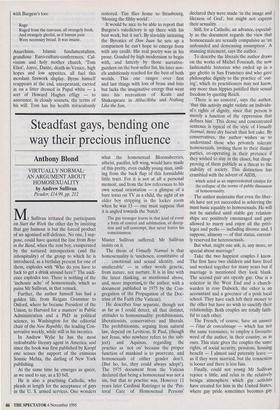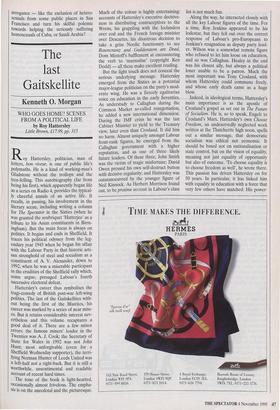Steadfast gays, bending one way their precious influence
Anthony Blond
VIRTUALLY NORMAL: AN ARGUMENT ABOUT HOMOSEXUALITY by Andrew Sullivan Picador, £14.99, pp. 212 Mr Sullivan irritated the participants on Start the Week the other day by insisting that gay humour is but the forced product of an agonised self-defence. No one, I sup- pose, could have quoted the line from Boys in the Band, when the rent boy, exasperated by the tortured introspection (and the inhospitality) of the group to which he is introduced, as a birthday present for one of them, explodes with 'Who do you have to fuck to get a drink around here?' The audi- ence explodes too. There is nothing of the `inchoate ache' of homosexuals, which so pains Mr Sullivan, in that remark.
Further, the author himself has had a golden life, from Reigate Grammar to Oxford, where he became President of the Union, to Harvard for a masters' in Public Administration and a PhD in political science, to Washington for the editorial chair of the New Republic, the leading Con- servative weekly, while still in his twenties.
In Andrew Wylie he has the most redoubtable literary agent in America, and since the book was first published by Knopf one senses the support of the eximious Sonnie Mehta, the darling of New York publishing.
At the same time he emerges as queer, as we used to say, as a $3 bill.
He is also a practising Catholic, who pleads at length for the acceptance of gays in the U. S. armed services. One wonders what the homosexual Bloomsberries, atheist, pacifist, left wing, would have made of this pretty, even cuddly young man, smil- ing from the back flap of this formidable little tract. For it is not at all a personal memoir, and from the few references to his own sexual orientation — a glimpse of a bare torso on TV as a child, the sight of an older boy stripping in the locker room when he was 15 — one must suppose that it is angled towards the 'butch'.
The gay teenager learns in that kind of event a form of control and sublimation, of decep- tion and self-contempt, that never leaves his consciousness.
Master Sullivan suffered; Mr Sullivan insists on it.
The thesis of Virtually Normal is that homosexuality is `unchosen, constitutive of . . . emotional and sexual identity, and unalterable' — in other words genetic, from nature, not nurture. It is in line with the latest thinking, as mentioned above, and, more important, to the author, with a document published in 1975 by the Con- gregation of the Propagation of the Doc- trine of the Faith (the Vatican).
He describes four separate, though not as far as I could detect, all that distinct, attitudes to homosexuality: prohibitionists, liberationists, conservatives and liberals. The prohibitionists, arguing from natural law, depend on Leviticus, St Paul, (though not Jesus, who nowhere refers to the sub- ject) and Aquinas, regarding the practice as 'not on' because the proper function of mankind is to procreate, and homosexuals of either gender don't. (But ho, ho, they could always adopt!). The 1975 document from the Vatican declared that being a homosexual was not a sin, but that to practise was. However 11 years later Cardinal Ratzinger in the 'Pas- toral Care of Homosexual Persons' declared they were made 'in the image and likeness of God', but might not express their sexuality.
Still, for a Catholic, an advance, especial- ly as the document regards the view that homosexuals are sexually compulsive as 'an unfounded and demeaning assumption'. A stunning statement, says the author.
To describe the liberals the author draws on the works of Michel Foucault, the now fashionable historian who ended up in a gay ghetto in San Francisco and who gave philosophic dignity to the practice of 'out- ing', which its practitioners may not know, any more than hippies justified their sexual freedom by quoting Reich.
`There is no concern', says the author, `that this activity might violate an individu- al's rights of dignity, since that person is merely a function of the oppression that defines him'. This dense and concentrated sentence is typical of the style of Virtually Normal, more dry biscuit than hot cake. By conservatives, the author wishes us to understand those who privately tolerate homosexuals, inviting them to their dinner parties, co-operating in their pretence if they wished to stay in the closet, but disap- proving of them publicly as a threat to the stability of society. This distinction has crumbled with the advent of AIDS,
which acted as an unprecedented catalyst for the collapse of the norms of public discussion of homosexuality.
The author maintains that even the liber- als have not yet succeeded in achieving the most basic equality to homosexuals. He will not be satisfied until stable gay relation- ships are positively encouraged and gays allowed to marry and enjoy all the privi- leges and perks — including divorce and, I suppose, alimony — of that status, current- ly reserved for heterosexuals.
But what, might one ask, is, any more, so special about marriage?
Take the two happiest couples I know. The first have two children and have lived and worked together for many years but if marriage is mentioned they look blank. The second pair are openly gay. One is a solicitor in the West End and a church- warden in cosy Dulwich, the other is an accountant and a governor of a posh local school. They have each left their money to the other but have no wish to sanctify their relationship. Both couples are totally faith- ful to each other.
The French, of course, have an answer — l'etat de concubinage — which has not the same resonance, to employ a favourite word of the author, in their country, as in ours. This state gives the couples the same rights, of social security, pensions, housing benefit — I almost said paternity leave — as if they were married, but the connexion is looser and there is less fuss.
Finally, could not young Mr Sullivan rejoice a little, and relax in the relatively benign atmosphere which gay activists have created for him in the United States, where gay pride sometimes becomes gay arrogance — like the exclusion of hetero- sexuals from some public places in San Francisco and turn his skilful polemic towards helping the seriously suffering homosexuals of Cuba, or Saudi Arabia?











































































 Previous page
Previous page